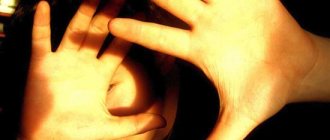Everyone experiences bad moods from time to time. Most of us deal with it on our own and get back to enjoying life. However, for some people, feelings of sadness and hopelessness do not dissipate on their own. It begins to affect the way you think, the way you feel, and the way you act. When these feelings persist for a long time, it is a sign of depression, a mood disorder that affects daily life and leads to psychological and physical problems. Let's consider the main symptoms and signs of clinical depression, what recommendations experts give for such a diagnosis, and what treatment is prescribed.
Informational portal
- Home >
- Depression ›
- Clinical (acute) depression
Clinical (acute) depression, or major depressive disorder , is a mental disorder that can manifest itself over a fairly long period of time. In the Middle Ages, major depressive disorder was viewed as “possession by the devil.” Patients with severe depression were tied up and beaten. The treatment was also appropriate: prayers, fasting, rituals of exorcism. Increasing interest in depression as a disease began during the Renaissance.
This type of depression requires urgent consultation with a specialist. Approximately 25% of people in the world experience at least one episode of acute depression in their lifetime. All segments of the population are susceptible to this disease.
Signs of clinical depression are:
- depression and feelings of worthlessness
- insomnia
- feeling tired
- feelings of guilt, thoughts about the meaninglessness of existence
- search for illnesses, the emergence of fears
- loss of appetite, psychosomatic disorders
- loss of interest in favorite activities
- gastrointestinal disorders and joint pain
- migraine, skin diseases
- decreased energy potential, libido, absent-mindedness
- excitement, irritability
- thoughts of suicide
The main method used to treat acute depression is medication. And the selection of medications is strictly individual. A person suffering from a mental disorder should not self-medicate, which can only cause harm. After the examination, the psychiatrist determines the severity of depression and prescribes appropriate treatment. It is necessary to involve a psychologist and psychotherapist in the treatment process. Acute depression differs from other mental disorders in its root cause, hidden in the depths of the subconscious (fears, psychological trauma, unfinished relationships, negative experiences). Finding the main cause of the disease, helping the patient control the situation, being confident, and strengthening his self-esteem are the main tasks of the attending physician. When helping people get out of depression, psychologists usually combine several methods (behavioral psychotherapy, humanistic psychotherapy, psychoanalysis). They also use a method to change sensations in the body as a way to solve psychological problems. In the fight against major depressive disorder, a psychologist helps patients change their usual facial expressions, their gait, and body position in different situations. At the first stage of treatment for depressive disorder, the main task is to learn how to relieve stress. Special trainings help with this, the essence of which is the ability to copy the behavior and habits of happy and healthy people (smile, straight shoulders, straight back).
Diagnostic methods and criteria
Diagnosis of major depressive disorder is based on clinical symptoms. WHO has defined the following criteria:
- decreased strength and activity,
- insomnia,
- diffidence,
- difficulty concentrating,
- frequent desire to cry,
- decreased interest in favorite activities, sex,
- feeling of hopelessness and despair,
- inability to cope with everyday household activities,
- sad thoughts about the past and future, pessimism,
- taciturnity,
- social alienation.
To make a diagnosis, the patient must have at least 5 of the listed symptoms. Signs of depression may include suicidal thoughts, plans or attempts to commit suicide. But the main symptoms include the classic triad:
- anhedonia - loss of interest in activities and activities that bring pleasure,
- depressed mood for two weeks or more,
- increased fatigue and decreased mental activity.
Special laboratory or instrumental diagnostic methods are not used. They are necessary only when it is necessary to exclude somatic pathologies leading to depressive syndromes.
Studies have shown that in depressive conditions, biomarkers can be identified that indicate an increased risk of developing mental pathology.
Tests for diagnosing depressive disorders
Identifying early symptoms of clinical depression is possible using special questionnaires and tests. General practitioners and gynecologists should diagnose patients with suicidal thoughts or when other external signs appear.
For preliminary self-assessment of depressive states, the Zang scale is used. It is proposed to answer 20 questions, 10 of them are positively oriented, and the second half are negative. The answer to the question could be as follows:
- never,
- Sometimes,
- often,
- constantly.
For each answer, points are assigned from 1 to 4. The results are assessed according to the following criteria:
- 20-49 points – normal mental state,
- 50-59 – mild depression,
- 60-69 – signs of moderate depression,
- 70-80 – severe depressive disorder.
Based on clinical observations, the Beck Depression Scale was developed in 1961. To conduct the test, the patient is given a questionnaire in which he notes the answers. They represent various symptoms and complaints that characterize a depressive state. There are 21 categories included, each answer can be scored from 0 to 3. The result is the sum of the points, where the norm is from 0 to 13, and severe depression is 29-63.
Tests allow you to assess the condition of patients upon diagnosis and after recovery. And the Hamilton scale can also be used during therapy to correlate its effectiveness. Unlike previous methods, the questionnaire is completed by a clinical specialist. The list of symptoms for the Hamilton scale is as follows:
- low mood,
- guilt,
- suicidal tendencies,
- difficulty falling asleep,
- average insomnia,
- early awakening,
- performance and activity,
- lethargy,
- activity (agitation),
- mental anxiety,
- somatic anxiety,
- gastrointestinal symptoms,
- general somatic disorders,
- sexual symptoms,
- hypochondria,
- weight loss,
- criticality of disease assessment,
- mood swings during the day,
- depersonalization and derealization,
- delusional disorders,
- obsessive and compulsive syndromes.
The Hamilton scale also evaluates the effect of antidepressants. Scores are given only for the first 17 symptoms; the rest are necessary to diagnose the subtype of the disorder. A score of 7 or less is considered the norm. A severe form of pathology is indicated by a score above 23.
WHO has developed a special questionnaire for major depression. It can be used to screen and determine the severity of the disorder. This method is highly sensitive for diagnosing pathology in the early stages.
Is clinical depression a dangerous borderline condition or a bad mood?
Clinical depression is a mental disorder that is severe and long-lasting. Another name for the condition is “acute depression.” The patient cannot cope with this disease on his own. Therefore, qualified assistance from specialists is necessary.
Anyone can experience this mental disorder. Regardless of age, gender, social status or race.
Causes of acute depression:
1. Biological.
In the human brain there are special substances that transmit information from one neuron to another. These are neurotransmitters. An increase or decrease in these hormones can lead to clinical depression.
People with low self-esteem and negative thought patterns are prone to depression.
Women experience acute depression more often than men. Perhaps this is due to the hormonal characteristics of the female body, their social status, and an increased sense of responsibility (for the family, for the children, for the home, etc.).
4. Serious illnesses.
People with severe physical illnesses are at risk.
5. Side effect from medications.
Clinical depression often occurs after various life situations. People have a hard time with divorces, financial losses, deaths of loved ones, layoffs from work, etc.
Symptoms of the disease are caused by changes in the brain. Neurotransmitters are unable to deliver signals in a timely manner or even stop transmitting them to nerve cells.
Signs of clinical depression:
- feelings of helplessness, hopelessness and hopelessness;
- lack of interest in everyday affairs and activities (work, communication, sex are uninteresting; interest in hobbies and hobbies disappears; nothing improves the patient’s mood);
- changes in sleep (some suffer from insomnia, while others cannot get enough sleep);
- changes in appetite (some patients are extremely hungry, and some cannot bring themselves to swallow even a bite);
- changes in psychomotor reactions (some people “sleep while walking”, while others become nervous and restless);
- constant fatigue (even when doing the simplest things);
- feelings of guilt and worthlessness;
- self-flagellation and constant self-criticism, even self-hatred;
- difficulties with concentration (difficulty making a decision, concentrating on a problem, remembering something).
Clinical depression very often causes the brain to send pain impulses to various parts of the body. Common physical symptoms:
- chronic back pain, worsening during depression;
- headaches, migraines;
- muscle and joint pain;
- chest pain not related to heart problems;
- frequent disruptions in the gastrointestinal tract (heartburn, constipation, nausea, vomiting, etc.);
- insomnia or oversleeping (strength is not restored during night sleep, a person feels tired all day);
- decreased or increased appetite;
- dizziness.
If symptoms persist for more than two weeks, we can talk about acute depression.
As mentioned above, you cannot do without the help of specialists. It is hardly possible to cope with depression on your own. And under no circumstances should you ignore it. Clinical depression is a borderline condition between mental health and illness. If a person crosses this line, then it will no longer be possible to regain mental health.
Stages of treatment for acute depression:
1. Drug therapy.
It is better for the patient to go to a hospital, where specialists will administer sedatives through IVs for some time. It is clear that a person will sleep a lot. But that's good.
2. Psychotherapeutic assistance.
Psychologists work individually and in groups. Patients learn relaxation, calming breathing, and stress relief. An interesting technique is when a patient copies the behavior of a happy person. He always smiles, walks straight, with his head held high. And so on until such behavior becomes his behavior.
An important condition for the effectiveness of psychotherapeutic assistance is the desire of the patient himself.
Auxiliary treatment methods:
- massage;
- frequent walks in the fresh air;
- bibliotherapy;
- art therapy;
- physical exercises and more.
When the patient gets better, the doctor can send him home. But for another two to three months, specialists will monitor the person’s adaptation to social conditions. After this period, as a rule, a positive lasting effect occurs.
The human psyche is very sensitive and vulnerable. One might even say, unpredictable. You never know how you will react to a life situation, action, word. Any of us can break. And it will take a very long time to recover.
Be attentive to those around you!
leave a comment
The information on the site is provided for informational purposes only, does not claim medical accuracy and is not a guide to action. Do not self-medicate. Consult your healthcare provider. The use of materials from the site is prohibited. Contacts | We are on Google+
Clinical depression: causes, symptoms, treatment
A quarter of the world's inhabitants have experienced clinical depression at least once in their lives. This disease is characterized by loss of interest in life and thoughts of suicide.
Recently, clinical depression, known since ancient times, has become widespread. But when medicine was just beginning to develop, it did not try to cure this disease. It was believed that a person was possessed by the devil, which exorcists were engaged in driving out.
Clinical depression, or classic acute depression, or major depression, or major depressive disorder is a psychosomatic pathology characterized by a pronounced mental disorder, the manifestations of which are noticeable over a long period of time.
The patient loses the desire to communicate with others, he does not receive any pleasure from life.
The development of the disease does not depend on age or membership in a particular social group.
Major depressive disorder can be caused by a variety of factors:
Reasons ↑
The development of the disease does not depend on age or membership in a particular social group.
Major depressive disorder can be caused by a variety of factors:
- Etiological. It is believed that one of the main factors influencing the development of the disease is the environment surrounding the patient in childhood. Most often, a depressive state develops in those people who lived in dysfunctional families, in conditions of frequent stress, physical and mental violence.
- Biological . Very often, in people who have severe clinical depression, the concentration of neurotransmitters in the brain that are responsible for a person’s mental health is disrupted (severely decreased or increased).
- Cognitive . The disease mainly manifests itself in people who have low self-esteem and a negative thinking pattern.
- Situational . Difficult life situations can lead to depressive disorder: death of loved ones, divorce, graduation, moving, moving to a new job, retirement, money problems, frequent conflicts, loneliness, lack of communication.
- Gender . Women are more likely to experience depression. It is assumed that this situation is associated with hormonal changes that occur during menstruation, pregnancy, childbirth and menopause, as well as stress due to numerous worries and responsibilities.
- Physical illnesses. Severe depression often manifests itself in people suffering from serious illnesses: cardiovascular, cancer, endocrine, diabetes, Parkinson's disease, Alzheimer's disease. Classic acute depression can occur when the endocrine system is disrupted, resulting in an increase in the concentration of cortisol, the stress hormone, in the patient’s blood.
- Medicines. The formation of a depressive state may be associated with side effects of medications taken, leading to a depressed state.
- Genetic predisposition . Very often, major depression develops in those people whose relatives have been diagnosed with mental illness.
Symptoms and first signs ^
The development of clinical depression is accompanied by:
- decreased ability to work;
- rapid development of fatigue;
- loss of vital energy;
- muscle weakness;
- inability to concentrate for a long time to complete certain work;
- fussiness, agitation and irritability or lethargy;
- depression and loss of mood;
- feeling of worthlessness;
- low self-esteem;
- formation of a guilt complex;
- constant search for diseases;
- the emergence of various fears;
- the emergence of thoughts about the meaninglessness of existence and suicide.
What are the signs of severe depression? Read on.
The above symptoms may include:
- pain;
- disturbance of appetite and sleep;
- weight loss or gain;
- skin diseases;
- malfunctions of the digestive and excretory systems;
- loss of sexual desire.
The disease is diagnosed based on the patient’s responses, taking into account the objective clinical picture.
To confirm the diagnosis, the concentration of depression markers is measured. This is the name given to certain chemicals that are released into the blood during depressive disorders.
Psychotherapy and medication are used to treat major depressive disorder.
To cure the manifestations of the disease, psychotherapy uses a variety of techniques:
- behavioral therapy;
- humanistic therapy;
- hypnosis;
- psychoanalysis;
- neurolinguistic programming.
In the process of communicating with the patient, the psychologist looks for the root cause of the disease, pushes the patient to look for positive moments in life, convinces him of the possibility of achieving goals, helps him gain confidence in his abilities and increase self-esteem, and teaches him to control the situation.
Psychologists also use in their work:
- various trainings, during which the patient is taught to relax and walk with a smile, head held high, shoulders back and back straight;
- tests that train memory and concentration;
- calming breathing;
- physical exercise;
- situational scenes.
Classes with the patient can be conducted individually or in a group.
Why keep a personal diary? Read on.
Read the article on how to get rid of depression yourself.
Drug treatment includes:
- antidepressants;
- tranquilizers;
- sedatives;
- mental stimulants.
But medications should only be selected by a doctor, taking into account the individual characteristics of the patient, since if used incorrectly, they can lead to worsening of the condition and side effects.
Drinking alcohol is strictly prohibited during treatment. It is recommended to walk in the fresh air more often and read books.
The following will help prevent the development of clinical depression and other disorders:
- active lifestyle;
- proper alternation of work and rest;
- timely treatment of all emerging diseases;
- Seeing a doctor at the first signs of a mental disorder.
Did you like the article? Subscribe to site updates via RSS, or follow updates on VKontakte, Odnoklassniki, Facebook, Google Plus or Twitter.
Tell your friends! Share this article with your friends on your favorite social network using the buttons in the panel on the left. Thank you!
Caution – if symptoms of clinical depression occur, seek immediate treatment
Clinical (acute) depression, or major depressive disorder, is a mental disorder. Clinical depression requires urgent consultation with a specialist. 25% of people worldwide experience at least one episode of acute depression in their lifetime.
You need to understand that clinical depression is a serious problem. This type of depression increases the likelihood of inappropriate behavior, such as addiction to drugs or alcohol. The illness can also disrupt relationships, cause problems at work, and make it more difficult to treat underlying conditions.
Clinical depression, also known as major or severe depression, is an illness that involves the body, mood, and thoughts. It affects everything from how you eat to how you sleep at night. The disease affects self-esteem and loved ones.
People suffering from depression cannot simply “pull themselves together” and recover. Without proper treatment, including antidepressants and/or psychotherapy, clinical depression can last for weeks, months, or even years. However, proper treatment helps most people get rid of the diagnosis of depression.
People suffering from depression cannot simply “pull themselves together” and recover.
Types of Depression
There are several forms of depression. Below are some of the most common types.
Severe depression
A person with severe depression experiences a constant state of sadness. They may lose interest in activities they previously enjoyed.
Treatment usually includes medication and psychotherapy.
Persistent depressive disorder
Also known as dysthymia, persistent depressive disorder causes symptoms that last at least 2 years.
A person with this disorder may have episodes of severe depression as well as milder symptoms.
Bipolar disorder
Depression is a common symptom of bipolar disorder, and research suggests that people with the disorder may have symptoms about half the time. This makes bipolar disorder difficult to distinguish from depression.
Psychotic depression
Some people experience psychosis with depression.
Psychosis can include delusions such as false beliefs and a detachment from reality. It may also include hallucinations—perceptions of things that do not exist.
Postpartum depression
After childbirth, many women experience depression. When hormone levels return after childbirth, this can lead to mood changes. Postpartum depression, or postnatal depression, is more severe.
There is no single cause for this type of depression, and it can persist for months or years. Anyone experiencing persistent depression after childbirth should seek medical help.
Major depressive disorder with seasonal pattern
Formerly called seasonal affective disorder, this type of depression is associated with decreased daylight during the fall and winter.
People living in countries with long or harsh winters seem to suffer more from this condition.
The impact of clinical depression on physical health if the disease is ignored
There is ample evidence that clinical depression takes a serious toll on physical health. The most recent studies examining the topic of health and major depression were conducted with the participation of patients with apoplectic stroke and coronary heart disease. The results showed that patients with symptoms of major depression who were recovering from strokes and heart attacks experienced a longer recovery period. They also found it more difficult to follow their doctor's orders and deal with the consequences of their illnesses. Another study found that people with symptoms of major depression had a higher risk of death within the first few months after a heart attack.
Individuals with symptoms of major depression have a higher risk of death within the first few months after a heart attack.
Sleep in a clinically depressed patient without treatment
One of the most prominent symptoms of clinical depression is a change in sleep patterns. Although the most common problem is insomnia (difficulty falling asleep), people sometimes feel an increased need for sleep. In this case, they need more time to recuperate at night. Lack of sleep can cause the following symptoms:
- increased fatigue;
- loss of energy;
- difficulty concentrating;
- difficulties in making decisions.
In addition, there are cases when, as a result of clinical depression, a person gains or loses weight, and remains in a state of hopelessness, helplessness and irritability. Depression is more than a bad mood. Why is treatment for depression necessary? Treatment for depression helps a person eliminate the symptoms of the disease.
Signs of drug and alcohol abuse in a depressed patient
Alcohol and drug abuse are common among people with clinical depression. This is especially common:
It is important to encourage these individuals to seek help because they are more likely than others to have suicidal thoughts.
Signs of drug and alcohol abuse include:
- inability to maintain close relationships;
- secret drinking of alcohol;
- self-pity;
- tremor;
- unexplained memory loss;
- reluctance to talk about drugs or alcohol.
Those who suffer from depression and also abuse drugs or alcohol require special treatment.
Symptoms
Clinical depression that requires treatment has a number of signs that can distinguish it from ordinary fatigue. If they are present in a person for 2 weeks or more, it is advisable to seek advice from a psychologist. Typical symptoms include:
- suicidal thoughts;
- loss of usual interests and loss of pleasure from things that used to elevate mood;
- decreased level of concentration;
- unusually high fatigue;
- night sleep disturbances and daytime sleepiness;
- bad mood throughout the day;
- the appearance of indecision when making even minor decisions;
- pronounced decrease in self-esteem;
- the appearance of unreasonable feelings of guilt;
- weight loss with a normal diet.
Differences in the hallmarks of depression among men and women
Men with symptoms of clinical depression may express more anger, frustration, and engage in more aggressive behavior than women. In addition, representatives of the stronger sex who ignore their disease expose themselves to such dangers as careless driving and unprotected sex. Symptoms of depression may include:
Living with a depressed person can be very difficult and stressful for family members and friends. It is very good if one of the family members is aware of the problems associated with the depressive state of a loved one, monitors him and treats him on the recommendation of a doctor.
Depression carries a high risk of suicide. This is the worst outcome of the disease when the patient refuses treatment. Anyone who expresses suicidal thoughts or contemplates taking their own life should be monitored by specialists.
Most people with symptoms of clinical depression do not attempt suicide. But according to the National Institute of Mental Health, more than 90% of people who take their own lives suffered from depression and other mental disorders or substance abuse problems. More often in such cases, men committed suicide (70% of cases).
40% of all suicide victims are adults over the age of 60. Older people are more likely to experience depression due to the loss of loved ones and friends - after all, they pass away. Also, older people have more chronic diseases; not always pleasant changes occur in their lives, for example, retirement or caring for a loved one.
It is believed that there are 3 signs of a potential suicide. In turn, signs of impending suicide include:
Types and varieties of major depressive disorder
Clinical depression does not always occur in the classic combination of symptoms. It may be combined with other symptoms, or have unusual manifestations. The following forms are distinguished:
- Psychotic - classic signs are combined with psychotic symptoms, patients have hallucinations, delusions, and psychomotor abnormalities. But hallucinations or delusional disorders, unlike schizophrenia, always have a sad, depressing coloration and correspond to the general mood of a person in a state of depression.
- Atypical – the classic signs of major depression are accompanied by atypical symptoms, which can complicate diagnosis. More common in young people, during adolescence. It is characterized by hypertrophied vegetative symptoms, pathological drowsiness, increased appetite, up to bulimia nervosa.
- Postpartum – occurs in women within a year after childbirth. It differs from postpartum melancholy in that it can go away on its own. A depressed woman can cause harm to both herself and her child. Postpartum depression can be mild or moderate.
- Seasonal - a type of pathology that tends to worsen in the autumn, the connection can be traced from year to year, the symptoms begin to intensify with a decrease in daylight hours and the number of sunny days, and decrease with the approach of spring or in patients who undergo ultraviolet therapy.
A special type of disorder is treatment-resistant depression. It can occur primarily and manifest itself as resistance to therapy with traditional drugs, which is caused by biological factors. Resistance can be relative, which develops after prolonged use of drugs for treatment and the development of resistance to them. Pseudo-resistance is observed with incorrectly selected treatment, when drugs do not have a point of application. Another type is intolerance, or intolerance to certain types of drugs.












